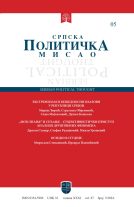- Home page
- Researchers
- Irina R. Milutinović
Irina R. Milutinović
Institute of European Studies, Belgrade, Serbia

INFORMATION POLICY IN “COVID-19” PANDEMIC CRISIS IN SERBIA
During the global health crisis caused by “Covid-19” virus pandemic, along with struggling to preserve human lifes and health, a scientific community is mobilizing against so-called infodemia. This media “epidemic” is also spreading globally, as cacophony of endless untruths, misinformation, false news and media manipulations, jeopardizing a public's competence to understand such an important discourse that frames life and death issues. Using an analytical and critical scientific approach and relevant theoretical framework including international legal norms, the aim of this study is to discuss information policy instruments applied in the Republic of Serbia during this pandemic crisis. Applied measures are observed as a part of Covid-19 crisis management. The subject of the research covers the period from the first registered Covid case in Serbia to а state of emergency cancellation, due to the epidemic curve decline (March 6 - May 6, 2020). The results of the study show characteristics of information policy measures in defined period: inconsistency, disproportion and political instrumentalization. Information policy instruments applied in managing this crisis have oscillated between insufficient seriousness in perceiving the problem and panic public warnings. Proportionality of measures such as information centralisation attempts and arrests of journalists and whistle-blowers, are disputable from the point of view of the European Convention on Human Rights and the International Covenant on Civil and Political Rights.

REPORTING ON SECESSION IN SERBIAN MEDIA: THE CASES OF SCOTLAND AND CATALONIA
This research relies on instrumentalist explanatory theories of secession and the media framing theory in order to examine discursive praxis through which Serbian journalists report on independence referendums being held in West Europe, with primary focus being dedicated to the case of Spain and the United Kingdom. The aim of the research is to investigate whether a comparison can be drawn between media discourse on the secession of Kosovo and interpretative patterns that are utilized when Serbian media report on attempts of Catalonia and Scotland secession. The goal is to conclude whether Serbian journalists produce subjective or objective and analytical articles when writing about the sensitive subject of separatism outside of the domestic political context. The sample is based on the Internet archive of ten newspapers and broadcasting agencies which substantively covered the issue of Scotland’s and Catalonia’s right to self-determination during the respective referendums. The results go against the initial hypothesis which predicted that discursive frames used in describing the secession of Kosovo would completely spill over to reports on West European cases, but confirm the lack of adequate analytical approach to secessionism in Serbian media. We found several equal interpretative patterns in both observed media discourses - on Catalonia and Scotland secession attempts, on the one, and Kosovo secession, on the second hand. Those are: resistance to secession and other secessionist activities; support for central government anti-secessionist policies, and the European Union responsibility. Two key differences regarding previously framed discourse on Kosovo secession are: absence of secessionist leaders humiliation and more visible discourse of Serbian responsibility. When it comes to Kosovo and Catalonia secessionism comparation, the media mostly take over and reproduce the Serbian political mainstream agenda and interpretation. This is the way to instrumentalize this media topic in order to draw attention to Kosovo's problem, while supporting Serbian political leaders and disputing the European Union legitimacy (since it has supported Kosovo's secession). The mainstream media discourse has been challenged having in mind daily Danas, which frames the topics of secession by diversifying sources and subjects of reporting, using a larger share of analytical papers, and opening the perspective of Serbian political responsibility for secession of Kosovo. But this media discourse polarization has one broader and dominant (pro-government) and one minor and marginalized (pro-opposition) pole.

The Role of Information War in the Strengthening of Stereotypes about Russia in the Western Political Space
Negative perceptions of Russia as “the Other” in societies belonging to the Western political tradition have been shaped in a long historical perspective and have their own cultural and geopolitical matrix. These stereotypes mostly perceive Russia and its population through collectivism, authoritarianism and impulsiveness. Media and information policies play an indispensable role in shaping stereotypes in the modern and postmodern era. Therefore, the aim of this research is to point at the role of media discourse in supporting and forming negative stereotypes about contemporary Russia. In the introductory part of the Paper, the problem of stereotyping the notions of Russia and the Russians in the Western political space is contextualized, and then the case study on the empirical basis describes the role of the so-called Western media in supporting the established stereotypes in modern times. The main narratives of the information war between the European Union and the Russian Federation were used for media mediation and interpretation of events on the international scene in which the Russian Federation was the main actor during the year of sanctions (2014) and immediately afterwards (2015). We conclude that in the observed period there was a mutual deterioration of the images among the citizens of the EU and RF, while the leading media sacrificed the principle of impartiality of reporting.
